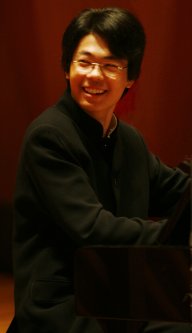A random draw and a jury decision has produced the statistical improbability that two Chinese pianists are playing in the Semi-finals this afternoon, and two Koreans this evening.
Wednesday afternoon’s session could be called the Triumph of Pianism. Yunquing Zhou and Kuok-Wai Lio are both 20 years old, both study at the Curtis Institute in Philadelphia, and both display astonishing technical skill. Playing thousands of notes in the right places is not a problem for either of them. The maturity to plumb the depths of the music they play so skillfully may still be a few years out.

Zhou’s fantastic control showed up again in Liszt’s b minor Sonata, which was super clear in rhythm and texture, though his tendency to race through the material denied it some of its demonic passion. But he clearly differentiated moods, colors and textures, and endowed each section of this episodic work with its own character and beauty. He demonstrated his attention to detail in his articulation of the fugue subject and the care with which he voiced the final bass note. But was a performance of such clarity and profile really in the spirit of Liszt?
A quite breathless flight through the Bartok Sonata of 1926 brought Zhou’s set to a conclusion. Highly rhythmic and well accented, the first movement reminded us of Stravinsky’s ‘Sacre’. Here, Zhou demonstrated an amazing ability to take a bit of liberty in tempo then jump right back on the train. The slow movement was full of harshly written chords, beautiful in their starkness. The busy, chattery final movement tried to break into Hungarian folk tunes but fell back into jazz. Zhou put so much of himself into the performance that he nearly fell backward off the bench on the final release. This kind of physical involvement, not to mention his skillful fingers, earned him a big round of applause before intermission.

Lio, as we’ve mentioned before, sits well back from the keyboard with his arms extended straight in front of him. It’s an interesting technique to watch — and to speculate about how he gets the kind of results he conjures out of the piano this way.
Whether or not Schubert’s ‘Four Impromptus’ were a wise choice for this stage in the competition, or even for the opening of this set, Lio teased some lovely details out of Schubert’s frequently repetitive musical ideas. He tends to make most of his contrasts through dynamic rather than color changes, which can make things sound relatively the same for minutes on end. The fourth, Mazurka-like Impromptu was full of runs which Lio negotiated stylishly.
Lio performed Debussy’s ‘L’Isle joyeuse’ skilfully, though with some awkward releases and a clanginess which made midrange chords poke out of the texture. We could have asked for more poetry and color to bring Debussy’s music to life, but like so many comments that have been made both in this blog and in your responses, this is largely a matter of personal taste.
Back to salon music, Lio ended with Fritz Kreisler’s ‘Liebeslied’ and ‘Liebesfreud’ as plumped up for the keyboard by Sergei Rachmaninoff. Once again, Lio’s digital facility was legendary, though these two crowd-pleasing encores would seem to beg for more playfulness and spontaneity. No matter — they did indeed please the crowd this afternoon.
Ladies and gentlemen of the virtual jury, when picking the four finalists, would you come down on the side of rewarding age, experience and musical depth, or youth, promise and technical prowess (not to say that the older contestants lack anything in dexterity or the younger in artistry)? There’s an interesting choice before you. Please tell us your thoughts (as some already have).



